[ad_1]
(houseofbhakti.com) – Great Vaiṣṇavīs | House of Bhakti
An excerpt from Śrīla Bhaktivedānta Nārāyaṇa Mahārāja’s lecture in Kijkduin, Holland, on July 12, 2005, published in Walking with a Saint – Morning Walks and Conversations 2007
“Some people think that śūdras and women are very low. This is actually a wrong idea – a very wrong idea. You should know you are neither male nor female. The soul is transcendental, a servant of Lord Śrī Kṛṣṇa, but we have now accepted a female or male form. It is not that intelligence is low in ladies and high in men.
“It is also not true that black people are necessarily śūdras. Who are śūdras? Those who eat cow flesh and drink alcohol, and those who cheat others. Śūdras are those engaged in diplomacy, duplicity, hypocrisy, and envy – whether they are black or white. I will speak something more on this topic, with reference to Śrīmad-Bhāgavatam.
“We are all spirit souls. The soul is not white or black. All souls are very beautiful. Regarding the transcendental 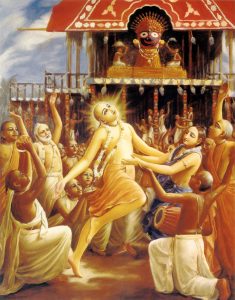 form of the soul, there is no question of who is less intelligent or more intelligent. If ladies are so low-class and so low in intelligence, how could the gopīs have defeated even Lord Śrī Kṛṣṇa? Why does our guru-paramparā, beginning from Brahmā and Nārada, worship the gopīs? Why did Śrī Caitanya Mahāprabhu – Śrī Kṛṣṇa Himself – adopt Śrīmatī Rādhā’s mood? Śrīmatī Rādhikā always defeats Kṛṣṇa in beauty, intelligence, and in all other ways. If ladies are less, why do we Gauḍīya Vaiṣṇavas want to be gopīs? We want to serve Lord Kṛṣṇa and Śrīmatī Rādhikā in a female form, not a male form. So how is it possible that this female form is lower? Don’t think like this.
form of the soul, there is no question of who is less intelligent or more intelligent. If ladies are so low-class and so low in intelligence, how could the gopīs have defeated even Lord Śrī Kṛṣṇa? Why does our guru-paramparā, beginning from Brahmā and Nārada, worship the gopīs? Why did Śrī Caitanya Mahāprabhu – Śrī Kṛṣṇa Himself – adopt Śrīmatī Rādhā’s mood? Śrīmatī Rādhikā always defeats Kṛṣṇa in beauty, intelligence, and in all other ways. If ladies are less, why do we Gauḍīya Vaiṣṇavas want to be gopīs? We want to serve Lord Kṛṣṇa and Śrīmatī Rādhikā in a female form, not a male form. So how is it possible that this female form is lower? Don’t think like this.
“Śrīla Vyāsadeva appeared in a family of śūdras, and Śrī Nārada Ṛṣi was also born in a śūdra-family. However, whoever calls them śūdras will go to hell. Śrīla Haridāsa Ṭhākura was born in a Muslim family. He appeared in a family in which cows were slaughtered and their flesh eaten, but he is not a Muslim.
“Rāmānanda Rāya said about himself, ‘I am śūdra.’ This is tṛṇād api sunīcena – humility. Mahāprabhu said about Himself, ‘I am a Māyāvādī sannyāsī.’ Was He a Māyāvādī sannyāsī? Of course not. One may say that He Himself said so, but He said so only out of tṛṇād api sunīcena.”

An excerpt from a morning walk with Śrīla Bhaktivedānta Nārāyaṇa Mahārāja in Badger, California, on June 22, 2007, published in Walking with a Saint – Morning Walks and Conversations 2007
Śrīpāda Nemi Mahārāja: Śrīla Gurudeva, in San Francisco you said that we should follow varṇāśrama-dharma, the system of four castes and spiritual orders of life. To what extent, or in what sense, do you want us to follow it? 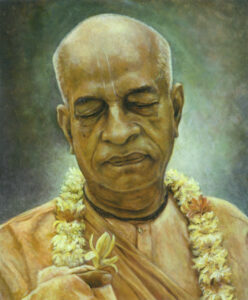
Śrīla Bhaktivedānta Nārāyaṇa Mahārāja: Follow it as your gurudeva, parama-pūjyapāda Śrīla Bhaktivedānta Svāmī Mahārāja, told you to follow.
If one is a brahmacārī, he follows the principles of brahmacarya; if one is a gṛhastha, he is an exemplary gṛhastha like Śrīvāsa Paṇḍita and other pure devotees. Those in the vānaprastha-āśrama follow the principles of varṇāśrama in their āśrama, and sannyāsīs follow the principles of those in the renounced order. This is varṇa and āśrama dharma, the religious system of social, occupational, and spiritual orders of life. You are not paramahaṁsas (self-realized souls), and that is why you have been told to follow. You must follow varṇāśrama.
Śrīpāda Nemi Mahārāja: Varṇas also? We should all work according to our propensity?
Śrīla Bhaktivedānta Nārāyaṇa Mahārāja: Varṇa and āśrama; both. Because we follow daiva-varṇāśrama (a division of society by qualification, not by birth, and executed for the pleasure of the Lord), everyone should accept that which is favourable for bhakti, not other things.
For example, we do not accept smārta-kriyā, activities performed according to smārta (regulative but not devotional) scriptures. The funeral ceremony for one’s father and mother should not be performed according to smārta regulations. If there is a fire sacrifice or a marriage, it should be done solely according to Vaiṣṇava scriptures and regulations.
Śrīpāda Nemi Mahārāja: What is the ladies’ position in varṇāśrama-dharma? You have always emphasized that ladies and gentlemen are equal in bhakti.
Śrīla Bhaktivedānta Nārāyaṇa Mahārāja: Sītā devī, Arundhatī, Anasūyā, Gārgī, Maitrī, Draupadī, Kuntī, and 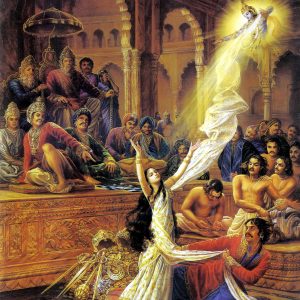 other Vaiṣṇavīs have been given so much respect in our śāstra and Vedic culture – on the same level as ṛṣis and maharṣis (the best of the great sages and saints).
other Vaiṣṇavīs have been given so much respect in our śāstra and Vedic culture – on the same level as ṛṣis and maharṣis (the best of the great sages and saints).
Śrīpāda Sajjana Mahārāja: Śrīla Prabhupāda has said that ladies are very good and men are very good, but together they are not very good.
Śrīla Bhaktivedānta Nārāyaṇa Mahārāja: If a man and woman are gṛhastha, it is okay for them to associate with each other. If they are not gṛhastha, their association will be the cause of their fall-down; this is māyā. Kāmadeva, Cupid, has defeated even Viśvāmitra, Brahmā, and Śaṅkara (Lord Śiva).* The only personalities he could not defeat were Nara-nārāyaṇa Ṛṣi and Nārada.
Śrīpāda Nemi Mahārāja: In ISKCON there was a problem because, supposedly, according to the ISKCON members’ understanding of varṇāśrama-dharma, ladies are less intelligent and in a lower position.
Śrīla Bhaktivedānta Nārāyaṇa Mahārāja: No, no. Never think like this.
Śrīpāda Mādhava Mahārāja: He is saying that in ISKCON they used to think like this, and they proclaimed that their conception was according to the principles of varṇāśrama.
Śrīpāda Nemi Mahārāja: That conception created a big problem.
Śrīla Bhaktivedānta Nārāyaṇa Mahārāja: Yes, certainly. They don’t give respect to ladies, but I give respect, and I want everyone to do so. We give respect according to an individual’s qualification.
Mahāprabhu dāsa: Can ladies take management positions in this society?
Śrīla Bhaktivedānta Nārāyaṇa Mahārāja: Oh, so much. In India, Indira Gandhi became the Prime Minister.
Mahāprabhu dāsa: So ladies do not just make babies?
Śrīla Bhaktivedānta Nārāyaṇa Mahārāja: They can make so many babies. Indira Gandhi had two very beautiful sons, and one of her sons became the Prime Minister. Her daughter-in-law, Sonya Gandhi, also has one son and one daughter, and her son may also become Prime Minister. In America, Clinton’s wife may become the President.
Mahāprabhu dāsa: I am a family man, Śrīla Gurudeva. I have a family, and I see that the girls are always more 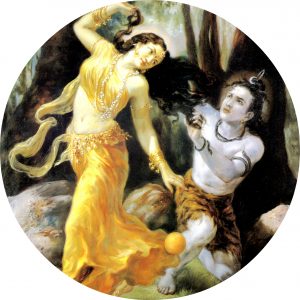 intelligent than the boys.
intelligent than the boys.
Śrīla Bhaktivedānta Nārāyaṇa Mahārāja: Yes, sometimes they are.
*Śrīla Bhaktivedānta Nārāyaṇa Mahārāja explained elsewhere that these great personalities were not actually defeated by Cupid; rather, they played that pastime in order to teach us conditioned souls how careful we must be in this regard.

An excerpt from a morning walk with Śrīla Bhaktivedānta Nārāyaṇa Mahārāja in Badger, California, on June 16, 2008, published in Walking with a Saint – Morning Walks and Conversations 2008
Raghunātha Bhaṭṭa dāsa: Śrīla Gurudeva, I have a practical question. Śrīla Gaura Govinda Mahārāja used to give us very strict instructions. He would say that men should not hear from women when women are singing in kīrtana or giving class. In the Gauḍīya Maṭha in India it is like this. Women do not give a class in the maṭha. Should we also follow this in the West?
Śrīla Bhaktivedānta Nārāyaṇa Mahārāja: You see what I am doing. I have women leading kīrtanas and bhajanas, and giving classes.
Raghunātha Bhaṭṭa dāsa: When you are present, it is all right. But when you are not present, if many women give class, the brahmacārīs may get disturbed.
Śrīla Bhaktivedānta Nārāyaṇa Mahārāja: When Jāhnavā Ṭhākurāṇī would give classes, all the brahmacārīs and sannyāsīs, including Śrīla Rūpa Gosvāmī, Śrīla Sanātana Gosvāmī, and others like them would offer her respect as Nityānanda-śakti (the eternal consort and potency of Nityānanda Prabhu).
Raghunātha Bhaṭṭa dāsa: Should we make a distinction between those who are advanced and those who are not? What is the standard?
Śrīla Bhaktivedānta Nārāyaṇa Mahārāja: The main thing is that men should not be attached to ladies.
Śrīpāda Mādhava Mahārāja: Those who are disturbed should not listen.
Śrīla Bhaktivedānta Nārāyaṇa Mahārāja: Ladies are generally not allowed to give a class in the Gauḍīya Maṭha, but if they are qualified they can do so. For example, there was a disciple of Śrīla Prabhupāda Bhaktisiddhānta Sarasvatī Ṭhākura named Sarojavāsinī. She was very bold; she would even question Śrīla Prabhupāda. Once she asked him, “If you are not giving guru-mantra or dīkṣā to ladies, should we go to another guru to receive this?”
Śrīpāda Mādhava Mahārāja: She asked, “Have you taken a vow to deliver only those in a male form and not in a female form?”
Śrīla Bhaktivedānta Nārāyaṇa Mahārāja: And thus she became Śrīla Prabhupāda’s first lady disciple.
Śrīpāda Mādhava Mahārāja: He was saying that if ladies give class, then the brahmacārīs will be disturbed by them.
Śrīla Bhaktivedānta Nārāyaṇa Mahārāja: Why? If Śyāmarāṇī or Umā give classes, why would any male be disturbed? Some ladies will give class; it is not that all will give.

Excerpt from the book Ācārya Kesarī Śrī Śrīmad Bhakti Prajñāna Keśava Gosvāmī – His Life and Teachings, 2nd Edition by Śrīla Bhaktivedānta Nārāyaṇa Mahārāja
While Śrī Vinoda-bihārī was residing in Vānarīpāḍā, he had become close to his two learned and religious paternal aunts, Śrīyutā Sarojavāsinī and Priyatamā-devī. They were respectively the first and second female disciples of the world-renowned jagad-guru Śrī Bhaktisiddhānta Sarasvatī Gosvāmī Prabhupāda. Both women were well-versed in bhakti-śāstra and were accomplished poets and authors. Their instructions on bhakti and their devotional lives had a great influence on their nephew.
 The following is an excerpt from a lecture given in Denpasar, Bali on February 25, 1997, by Śrīla Bhaktivedānta Nārāyaṇa Mahārāja (Editors’ input: Additional text from the book Ācārya Kesarī Śrī Śrīmad Bhakti Prajñāna Keśava Gosvāmī – His Life and Teachings, 2nd Edition has been included to facilitate the flow of content)
The following is an excerpt from a lecture given in Denpasar, Bali on February 25, 1997, by Śrīla Bhaktivedānta Nārāyaṇa Mahārāja (Editors’ input: Additional text from the book Ācārya Kesarī Śrī Śrīmad Bhakti Prajñāna Keśava Gosvāmī – His Life and Teachings, 2nd Edition has been included to facilitate the flow of content)
He [Śrī Vinoda-bihārī] was the monitor of the class and captain of different sports. How did he join the maṭha?
One of his aunts [Śrīyutā Sarojavāsinī] was a disciple of Śrīla Prabhupāda, Bhaktisiddhānta Sarasvatī, who had vowed not to accept 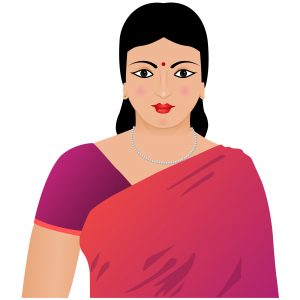 any lady disciples. She was very qualified and she went to Śrīla Prabhupāda and asked, “Why will you only give initiation to males and not to females? What offense have these ladies made? Have they not been separated from Kṛṣṇa? Why are they not qualified to receive mercy?”
any lady disciples. She was very qualified and she went to Śrīla Prabhupāda and asked, “Why will you only give initiation to males and not to females? What offense have these ladies made? Have they not been separated from Kṛṣṇa? Why are they not qualified to receive mercy?”
Prabhupāda then replied, “I will give you initiation right now,” and he gave.
Śrīla Prabhupāda was not giving the guru-mantra to anyone, he used to only give the kṛṣṇa-mantra, the gaura-mantra and the kāma-gāyatrī, not everything. And for ladies, not the brahma-gāyatrī, only the gopāla-mantra was given. This is initiation. Caitanya Mahāprabhu also only received this, but after Rūpa Sanātana, in order to achieve the qualification the present system by which one receives initiation came into use.
Previously he was not giving the guru-mantra; our Guru Mahārāja met him in 1916 and the second initiation was done in 1919 at the time of Gaura-pūrṇimā in Māyāpura. Prabhupāda gave all the mantras but not the guru-mantra, aiṁ gurave namaḥ, and others. He asked, “Why Gurudeva, why are you not giving us the guru-mantra?”
“I don’t give the guru-mantra.” he replied.
“Must a disciple approach some other guru to receive the guru-mantra?”
Then Śrīla Prabhupāda became so pleased that he gave the guru-mantra and from then on he began to give everyone the guru-mantra.

The following is an excerpt from a discourse on the glories of Śrīmati Gaṅgāmātā Ṭhākurāṇī delivered by Śrīla Bhaktivedānta Nārāyaṇa Mahārāja in Los Angeles, California, on June 4, 1998
In Bengal, around the time of Śrīla Rūpa Gosvāmī, a king and his family were living in Puṭiyā. The king had a very beautiful daughter named Śacī-devī, who, from a very young age, used to worship Śrī Śrī Rādhā and Kṛṣṇa. When Śacī-devī grew up somewhat, she decided that Śrī Kṛṣṇa is her only beloved. She determined, “I will not marry any person in this world, for my beloved is Lord Kṛṣṇa Himself – Śyāmasundara.”
When Śacī-devī became more mature, her father, mother and other relatives tried to persuade her to marry. But she told them very frankly, “I cannot marry any human being. I am already married. In my heart I have accepted Śrī Kṛṣṇa as my beloved. I want to go now to Vṛndāvana, to serve Him.”
Her parents could not change her mind, and at last her father helped her. He sent someone with her, to take her to Vṛndāvana. By this time Śrīla Rūpa Gosvāmī had left this world. Śrīla Sanatāna Gosvāmī and Śrīla Jīva Gosvāmī were also no longer in the world, and even Śrīla Rāghunatha dāsa Gosvāmī was not present.
The deity of Śrī Govinda-deva was there in Vṛndāvana at that time – not in Jaipur. There was a priest of Govinda-deva named Haridāsa Prabhu, who was a very learned person in the line of Śrīla Rūpa Gosvāmī. He was always chanting and remembering Kṛṣṇa with aṣṭa–sāttvika–bhāvas – with a melted heart and with tears in his eyes.
Śacī-devī inquired from Vṛndāvana’s residents, “Who is a qualified Vaiṣṇava here? I want to meet him.” Somehow she reached Śrīla Haridāsa Prabhu in the Govinda temple and heard his classes. By regularly hearing from him, she developed great faith and honour for him. She accepted him as her Guru and requested him, “I want to be initiated by you alone, I don’t want to accept any other Guru.” Haridāsa Prabhu examined her in so many ways, for about one year, and he saw that she was quite qualified. Then he gave her dīkṣā – initiation.
Haridāsa had many disciples, and among them there was a lady devotee whose age was about fifty. Because  Śacī-devī was still young at that time, about sixteen years old, he placed her hands in the hands of that elderly devotee and told her, “You are like Śacī’s older sister or mother. You should take care of her and remain in Vṛndāvana, and I want her to go on mādhukarī (begging at householders’ homes for a little prasādam). Although she is the daughter of a king and her father has sent so many gifts, facilities, and money, I prefer that she goes house to house, and begs one capātī from each house.”
Śacī-devī was still young at that time, about sixteen years old, he placed her hands in the hands of that elderly devotee and told her, “You are like Śacī’s older sister or mother. You should take care of her and remain in Vṛndāvana, and I want her to go on mādhukarī (begging at householders’ homes for a little prasādam). Although she is the daughter of a king and her father has sent so many gifts, facilities, and money, I prefer that she goes house to house, and begs one capātī from each house.”
She did this, and she ate very little. She used to take only what was required for maintaining her life; she refused anything more. She lived with that elderly lady in a very little hut in Vṛndāvana, and she lived very, very simply. Because she was so beautiful, her Gurudeva was somewhat worried about her, but he knew that if one is a chaste devotee, Lord Śrī Kṛṣṇa will save him or her.
Gradually Śacī-devī became 25 or 30 years old. By this time, after hearing all the classes of her Gurudeva and keeping a record of them in her heart, she became very learned in speaking Śrīmad-Bhāgavatam, like her Gurudeva was – just as now in Vṛndāvana, Savitā, Kavitā and others have become expert. Śacī-devī could recite Śrīmad-Bhāgavatam so well, especially Rāsa-pañcādhyāyī [the five chapters in the 10th Canto regarding rasa-līlā] including, Brahmara-gīta and all others. She used to weep bitterly during her classes, experiencing so many aṣṭa-sāttvika-bhāvas (eight kinds of transcendental ecstasies), and all those in her audience used to weep as well. All were charmed by her hari-kathā.
Śacī-devī’s Gurudeva then sent her to Rādhā-kuṇḍa, to live there. She remained there up to the age of fifty, and  at that time the elderly devotee left her body and she was left alone. She came to her Gurudeva and said, “What should I do, now that my elder guardian has left?” He replied, “I am also very old now. I may leave this world any day, so I am giving you a service. Go to Jagannātha Purī. The place of Sārvabhauma Bhaṭṭācārya is now neglected and ruined, and no one knows of it. I want you to go there and make it prominent. Illuminate awareness of that place. Do bhajana in that place, which is very near to the Gambhīra, where Śrī Caitanya Mahāprabhu used to live. This will increase your bhakti.
at that time the elderly devotee left her body and she was left alone. She came to her Gurudeva and said, “What should I do, now that my elder guardian has left?” He replied, “I am also very old now. I may leave this world any day, so I am giving you a service. Go to Jagannātha Purī. The place of Sārvabhauma Bhaṭṭācārya is now neglected and ruined, and no one knows of it. I want you to go there and make it prominent. Illuminate awareness of that place. Do bhajana in that place, which is very near to the Gambhīra, where Śrī Caitanya Mahāprabhu used to live. This will increase your bhakti.
Śacī-devī went to Jagannātha Purī, and there she delivered very sweet classes on Śrīmad-Bhāgavatam. Within a few days, so many became charmed. Many good and learned devotees began to come to hear her hari-kathā.
One day, a brāhmaṇa from Jaipur came with his deity of Śyāma-rāya [Śrī Kṛṣṇa, also known as Rasika-rāya and Rāya-kiśora]. When that brāhmaṇa was in Jaipur, he had a dream in which his deity told him, “Take Me to Śacī-devī. You are neglecting Me. You are not properly serving Me. At once, without delay, take Me to Purī. If you do not do so, your whole dynasty will be ruined.”
That brāhmaṇa thus took his Śālagrāma and that deity, Śyāma-rāya. Because Śacī-devī considered that Lord Śrī Kṛṣṇa alone was her beloved, Śrī Kṛṣṇa, Śyāma-rāya, wanted to meet her and be served by her. The deity form of Śyāma-rāya was blackish and very beautiful, but very, very small – like Govinda, Gopinātha, Madana-mohana. That brāhmaṇa took Him on his head in a basket and began coming, coming, coming. There was no railway or anything of the sort; so he came by walking, and this took him several months.
When the brāhmaṇa reached Jagannātha Purī, he came to Śacī-devī. After telling her about his dream he said, “Please take Him.” Śacī-devī refused, saying, “I am a niṣkiñcana (without material possessions) Vaisnavī, I cannot serve any deity. I always do bhāva-sevā (serving internally with the pure emotions of the soul). I have nothing – not one farthing to procure any paraphernalia, like a throne, flowers and so on. I only beg one capātī here and there. I go to the Jagannātha temple and accept some mādhukarī (alms of mahā-prasādam). Mahā-prasādam cannot be offered again, so how would I offer anything to the deity? I have not a farthing with me. I would not be able to maintain the worship of this Śyāma-rāya.” She totally refused.
In Kali-yuga it is very hard to serve Śrī Śrī Rādhā and Kṛṣṇa or Śrī Caitanya Mahāprabhu. After some time, the day will come when arcana (deity worship) will not be maintained. Just as the Mohammedans broke the temples of India, occupied them and committed so many atrocities, a great struggle is going on in this regard even today. A day may come when we cannot freely do arcana because the atheists will be very powerful.
The brāhmaṇa feared, because of what was said in his dream, that his dynasty would be destroyed. He therefore left that deity there, in the forest of Tulasī plants that Śacī-devī was maintaining. It was a very big area of Tulasī plants; it was like a jungle.
So that brāhmaṇa left the deity there and ran away. Śyāma-rāya then gave a dream to Śacī-devī, saying, “He has left Me here. I have not eaten anything, nor have I even bathed. I am waiting for you. If you don’t come, I will have to starve.” Śacī-devī went there at once, and she saw that very beautiful deity of Śyāma-rāya. She picked Him up and took Him, and she kept Him in her hermitage.
One day – on this day – the day of the appearance of Gaṅgā in this world, all the prominent devotees went to  bathe in Gaṅgā, very far away, in Bengal, in Calcutta and in Navadvīpa. So many people went, and Śacī-devī also wanted to take a bath in the Ganges. She started to go there, but she thought, “Who will serve Śyāma-rāya, my beloved? She could not go, and she was very worried about this, thinking, “Oh, I could not go to take a bath.” While she slept in the night, she dreamt she saw Gaṅgā coming towards her place. She heard kal-kal-kal-kal, the sound of the waves of Gaṅgā-devī, and she saw a very big lake or pond. So many people were taking a bath there, chanting “Haribol! Haribol!” and she also went to take a bath. She took a bath, but the current was so strong that it carried her to the Jagannātha temple, where Jagannātha, Subhadrā, Baladeva and Sudarśana presided. Although the door of the temple was closed, the current carried her inside.
bathe in Gaṅgā, very far away, in Bengal, in Calcutta and in Navadvīpa. So many people went, and Śacī-devī also wanted to take a bath in the Ganges. She started to go there, but she thought, “Who will serve Śyāma-rāya, my beloved? She could not go, and she was very worried about this, thinking, “Oh, I could not go to take a bath.” While she slept in the night, she dreamt she saw Gaṅgā coming towards her place. She heard kal-kal-kal-kal, the sound of the waves of Gaṅgā-devī, and she saw a very big lake or pond. So many people were taking a bath there, chanting “Haribol! Haribol!” and she also went to take a bath. She took a bath, but the current was so strong that it carried her to the Jagannātha temple, where Jagannātha, Subhadrā, Baladeva and Sudarśana presided. Although the door of the temple was closed, the current carried her inside.
In the meantime, the time of maṅgala–ārati came, and the pujārīs heard some sound in the temple. They reported this to the king and the head priest, who came, opened the door and saw this devotee. They said, “Oh, she is also a thief? She was preaching so much kṛṣṇa-kathā – giving classes – and now she is a thief! How did she enter here? She should be put in jail.” Thus, she was put in jail.
That night, Lord Jagannātha told the king in a dream, “At once go there and apologize. She is My potency. You should go and take initiation from her. In fact, all your learned council members should go to her and take initiation from her. If you do not obey Me, I will destroy your entire kingdom and dynasty. Go at once.” Lord Jagannātha also said, “From today onward her name is Gaṅgāmātā Ṭhākurāṇī because I have brought My Gaṅgā here only for her. You should all go today, take initiation from her and give her some donations. According to her desire, you should make a very beautiful temple and develop the house of Sārvabhauma Bhaṭṭācārya. Do everything she desires.”
The king went there at once, with his entire council. All the brāhmaṇas and pāṇḍās went to Gaṅgāmātā Ṭhākurāṇī – to that Śacī-devī – and apologized for their accusations and offences. They begged her, “Please give us initiation.” Śacī-devī replied, “How can I do that? I don’t want to initiate anyone.”
Placing his head at her lotus feet, the king requested her again and again. At last she agreed; she gave initiation to the king and all his associates.
Then the king said, “I want to give you some donations. What do you want?” She replied, “If you want to do something, my Gurudeva has ordered that I should establish the place of Sārvabhauma Bhaṭṭācārya.”
In a short time the king built a very good temple, and also the places of Sārvabhauma Bhaṭṭācārya where Śrī Caitanya Mahāprabhu and Sārvabhauma Bhaṭṭācārya used to sit and discuss Vedānta-sūtra. Gaṅgāmātā Ṭhākurāṇī’s deity, Śyāma-rāya, was also established there, and she herself became very prominent throughout Purī. All the Purī devotees came to hear her Śrīmad-Bhāgavatam discourses. Still today close to the Jagannātha temple is Sveta-Gaṅgā. Even today, all pilgrims go there and take a bath, and they consider, “We are taking a bath in the Ganges.”
So this is Gaṅgāmātā Ṭhākurāṇī. She was a very powerful ācārya.
Source: Purebhakti.com
Image/Art made possible by Pixabay.com, Krishnapath.org and/or Bhaktiart.net
Unless indicated differently, all verse translations and quotes are from the books
by Śrīla Bhaktivedānta Svāmī Mahārāja Prabhupāda (Vedabase.com)

[ad_2]
#Great #Vaiṣṇavīs #House #Bhakti






